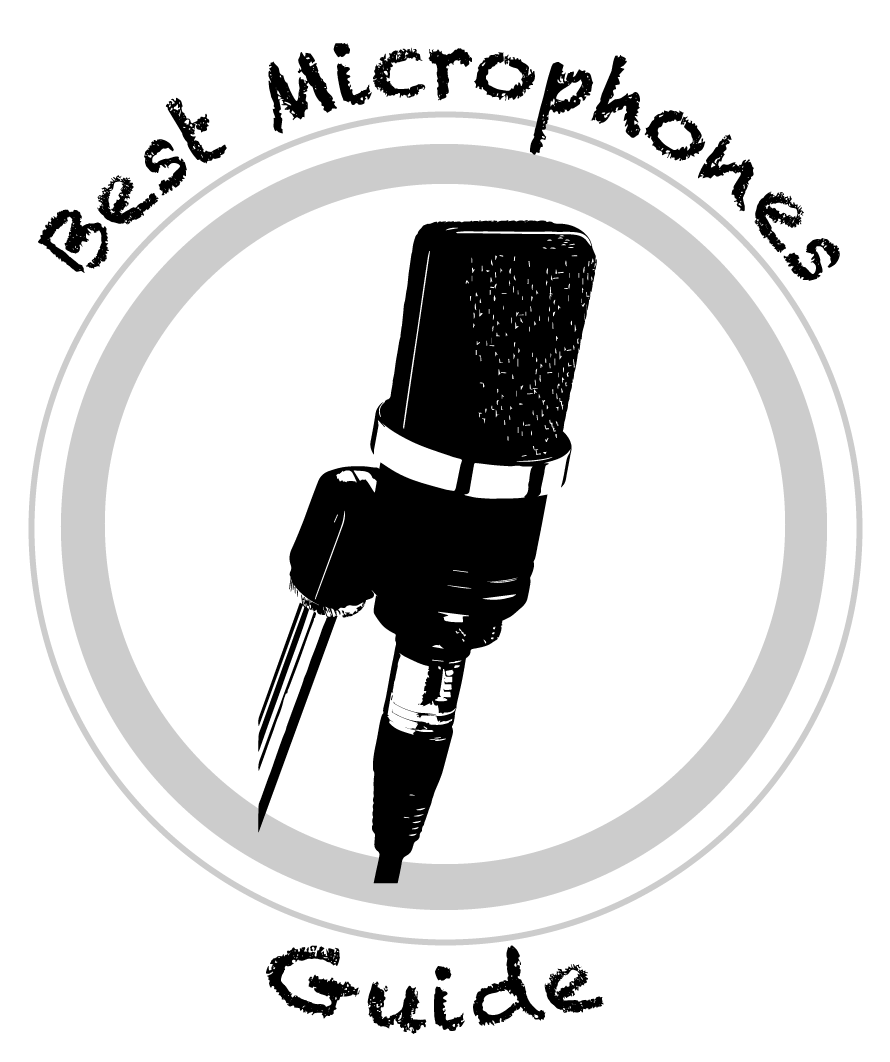The Best Microphones for Recording Electric Guitar
As an Amazon Associate, I earn from qualifying purchases at no additional cost to you.

We have you covered in our Best Mics for Recording Electric Guitar selections whether you are looking to buy your first microphone for recording electric guitar, or whether you are looking to pick up an additional microphone to provide you with a different sound on your tracks to make your recordings more interesting.
Background Information:
For our Best Microphones for Recording Electric Guitar list, we did extensive testing to determine the best mics for electric guitar, and the results were sometimes surprising.
Microphones were tested on both solid state and tube amps using multiple electric guitars, both clean and with distortion. All microphones were positioned half way between the center and edge of the amplifier speaker, and up close to the speaker.
Our Top Picks at a Glance:
| Our Top Picks | Microphone |
| Best Overall: | Sennheiser MD421-II |
| Runner Up: | Sennheiser e906 |
| Best Value: | Shure SM57 |
| Best for Distortion: | Sennheiser MD421-II |
(commissions earned)
For full reviews and test results, read on below
The Best Overall Microphones for Recording Electric Guitar:
- Sennheiser MD421-II – The Sennheiser MD421-II is our best mic for recording electric guitar. This microphone is often considered the main alternate microphone of choice to record electric guitars in professional studio settings. The Shure SM57 is usually considered the industry standard. However, in our testing, the Sennheiser MD421-II outperformed the SM57 in most areas by a significant margin.
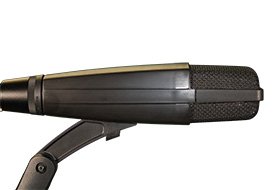 Recording electric guitars with higher levels of gain, the MD421 is capable of capturing, even while recording combo amps, a big, “in your face,” spacious and wide sound that sounds great. The MD421-II does an impressive job on muted notes and chords as well. Overall the Sennheiser MD421-II earned our top rating for recording distorted electric guitars, edging out the Sennheiser e906.
Recording electric guitars with higher levels of gain, the MD421 is capable of capturing, even while recording combo amps, a big, “in your face,” spacious and wide sound that sounds great. The MD421-II does an impressive job on muted notes and chords as well. Overall the Sennheiser MD421-II earned our top rating for recording distorted electric guitars, edging out the Sennheiser e906.
In terms of recording clean guitar, results were slightly more mixed for the Sennheiser MD421, which still performed very well. For strumming clean chords, the MD421 performed very strongly, taking the top ranking. On arpeggios or other single notes, it ranked second behind the e906, but the e906 was noticeably better in this area.
The MD421’s price point is usually double the e906 and quadruple the SM57. However, it is worth noting that in addition to being our top rated pick for recording electric guitar, the MD421-II is a very valuable all around dynamic microphone. It is one of the top microphones used to record snare drums and toms. It does a wonderful job with spoken word for youtube, podcasting, or gaming, and is in general a very underrated vocal microphone.
So if you invest in this microphone, you will likely find many uses for it, and you will probably never regret having it in your mic locker.
- Sennheiser e906 – The e906 is our second pick for our Best Mics for Recording Electric Guitar list. This microphone was designed specifically with the electric guitar in mind. Very conveniently, its flat design allows for it to be hung from over the top of the amp for either studio use or live performance, eliminating the need to set up a mic stand.
Of Sennheiser’s 2 similar models, the e906 is considered the high end model, with a 3 way switch to customize the sound and a wider frequency response. The Sennheiser e609 (* commissions earned) is the lower end model.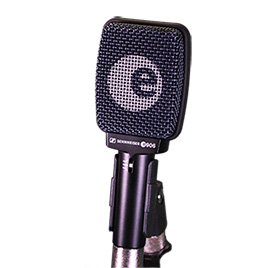 For recording distorted electric guitar, the Sennheiser e906 tested as a very strong performer, just a notch behind the MD421-II. Like the MD421, it also captured a big, “wall of sound” type sound for hard rock chords. The e906 handled muted notes and chords nicely, with excellent detail. Lead guitar sounds great too. All in all, it tested well across the board for hard rock guitar.
For recording distorted electric guitar, the Sennheiser e906 tested as a very strong performer, just a notch behind the MD421-II. Like the MD421, it also captured a big, “wall of sound” type sound for hard rock chords. The e906 handled muted notes and chords nicely, with excellent detail. Lead guitar sounds great too. All in all, it tested well across the board for hard rock guitar.
For clean electric guitar strumming, the e906 had a more prominent low end than the MD421 in a way that didn’t sound quite as good. However, it does have the 3 way switch and this could likely be corrected by using the roll off.
However, for recording clean arpeggios or other single notes, the e906 gets our top rating and was a real standout. Here it produced very full and rich sounding tones. There was a significant gap between the e906’s strength in this area and our second choice, the MD421. Ironically, it may have been the additional bass tones that didn’t sound quite as good on chords that made the single notes stand out with a more full and rich sound.
The e906 includes a 3 way switchable presence filter that allows you to adjust the sound. You can boost the presence (Sennheiser refers to this setting as “bright”). You can also attenuate the presence (Sennheiser calls this “smooth.”) All testing was done with the switch in the normal position. However, having these settings available is a great option that adds to the versatility of the mic and can help you to customize the sound of your recording.
The e906 is also an excellent choice for miking snare drums and toms.
- Shure SM7B – The third selection on our Best Mics for Recording Electric Guitar list may be a bit of a surprise. The Shure SM7B is famous for its use in recording vocals, especially rock vocals. It is also ubiquitous in podcast and interview settings. Almost anyone who has watched a podcast or interview on YouTube has surely seen one. It is one of the most famous dynamic microphones that are used in recording vocals.
 What is less known is that the Shure SM7B can also be used as a very high quality option to mic electric guitars. Surprisingly, in our testing, it came out slightly ahead of its similarly named dynamic microphone cousin by Shure, the SM57.
What is less known is that the Shure SM7B can also be used as a very high quality option to mic electric guitars. Surprisingly, in our testing, it came out slightly ahead of its similarly named dynamic microphone cousin by Shure, the SM57.
When used on electric guitar, the 2 microphones do not sound entirely dissimilar – they aren’t night and day tones. However, the SM7B produced a smoother, more balanced sound overall, with the SM57 tending to be a little brighter.
For distortion, the Shure SM7B captured a full, slightly husky, muscular electric guitar sound that sounded good across the spectrum of chords, muting, and lead guitar.
For clean electric guitar sounds, the Shure SM7B sounded best on lead guitar. It came in a little more jangly than we preferred on strums and arpeggios.
It probably does not make sense to buy a SM7B just to mic electric guitars. However, if you already own one for vocal use, or are considering buying one for vocals, it is well worth considering putting it to use for recording electric guitar, where it captured a really good sound.

- Shure SM57 – Our fourth pick on the Best Mics for Recording Electric Guitar with list is no surprise at all. The SM57 is the iconic microphone that is the most used microphone for miking electric guitars through the decades and all over the world. Many people think that if you could only have one microphone, this should be it as it does so many things well.
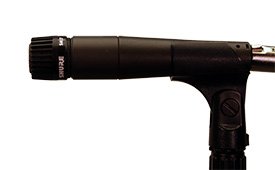
In the past, we used the SM57 almost exclusively for miking electric guitars in studio recordings. The truth is, that if this all you do, you will probably never have any reason to complain and you might never look around for a different microphone to use for this purpose.
The Shure SM57 will deliver solid results for you consistently. Your electric guitars will always sound good and this rugged, sturdy microphone will last you decades.
Additionally, for its affordable price point, you cannot beat the price for the quality. The price has amazingly stayed at about what it has always cost. So if you are just starting out and in need of an electric guitar mic, and are budget-conscious, you cannot go wrong in buying one.
However, in our testing, we found that the SM57, when compared to the microphones we ranked ahead of it (which are all significantly more expensive), had, for distorted electric guitar, a little bit more of a small room sound. The guitars did not sound quite as big and “in your face.” It has a very natural sound. This is also a matter of personal preference, and therefore could actually be a selling point to some people.
To be specific, it may lack some of the shimmering high end sustain that some of the other mics capture. It is worth emphasizing again that, it’s very a very good microphone – it sounds good and these points only apply when comparing it to these excellent, higher priced microphones.
For both clean strumming and arpeggios / single clean notes, the Shure SM57 was once again solid and capable. It was a little bit more thin sounding than the MD421-II and e906, and also had some less desirable treble tones cutting through occasionally.
The Shure SM57 is a microphone that will always have a place in your mic locker as it is extremely versatile as well. It is the most commonly used microphone to mic a snare drum. It can be used to mic an entire drum set – it does well on toms and kick drum too. In a pinch, you could even use 2 of them for drum overheads. It is a top microphone for electric guitar as well. It even does well on vocals.

- Neumann TLM 102 – For the final selection on our Best Microphones for Recording Electric Guitar list, we have the Neumann TLM 102. It is the most expensive microphone on this list, and the only condenser microphone on the list.
The Neumann TLM 102 is primarily known for its ability to record amazing, smooth, and natural sounding vocals. It actually took the top spot on our Best Microphones for Recording Vocals list. Condenser microphones are not quite as well known for recording electric guitar, but many of them do a good job. The Neumann TLM 102 is our pick of the group.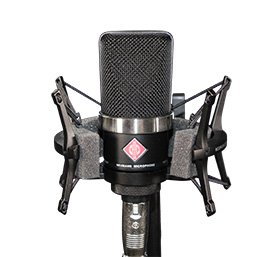
For recording distorted electric guitar, the TLM 102 recorded a beautiful, attention getting tone on lead guitar. For chords, it had a nice big guitar sound and a little bit of a beefy low end. The same beefy low end was noticeable on muted chords and notes, where it did a solid job.
When recording clean electric guitar, the Neumann TLM 102 shined on chords, displaying some of the natural sound that it is famous for on vocals. Clean chords sounded “just right” when using this mic. It eliminated some of the slightly shrill high end that entered into the recording efforts of some of the other mics we tested. Instead, the Neumann TLM 102 produced a warm and smooth recording of clean guitar chords being strummed.
For arpeggios and single clean notes, it sounded better closer to the amp and not as good when we tested moving it a little farther away as a condenser. Overall it was just a solid performance rather than something that stood out.
Similar to the Shure SM7B, it doesn’t make sense to buy this microphone just to record electric guitar. However, if you are considering it for vocals, or already have one, you can absolutely use it for recording electric guitar and put some great sounding results “on tape.” The mic’s versatility may help you to justify this mic’s price tag, though it is so good at vocals that the price tag is probably worth it anyway. It is also an excellent microphone for recording acoustic guitar and drum overheads.

Additional microphone recommendation for recording electric guitar: Many people swear by and recommend the Royer Labs R-121 Large Element Ribbon Microphone, which we were not able to test, for the purpose of recording electric guitar. It is expensive, but gets glowing reviews.
